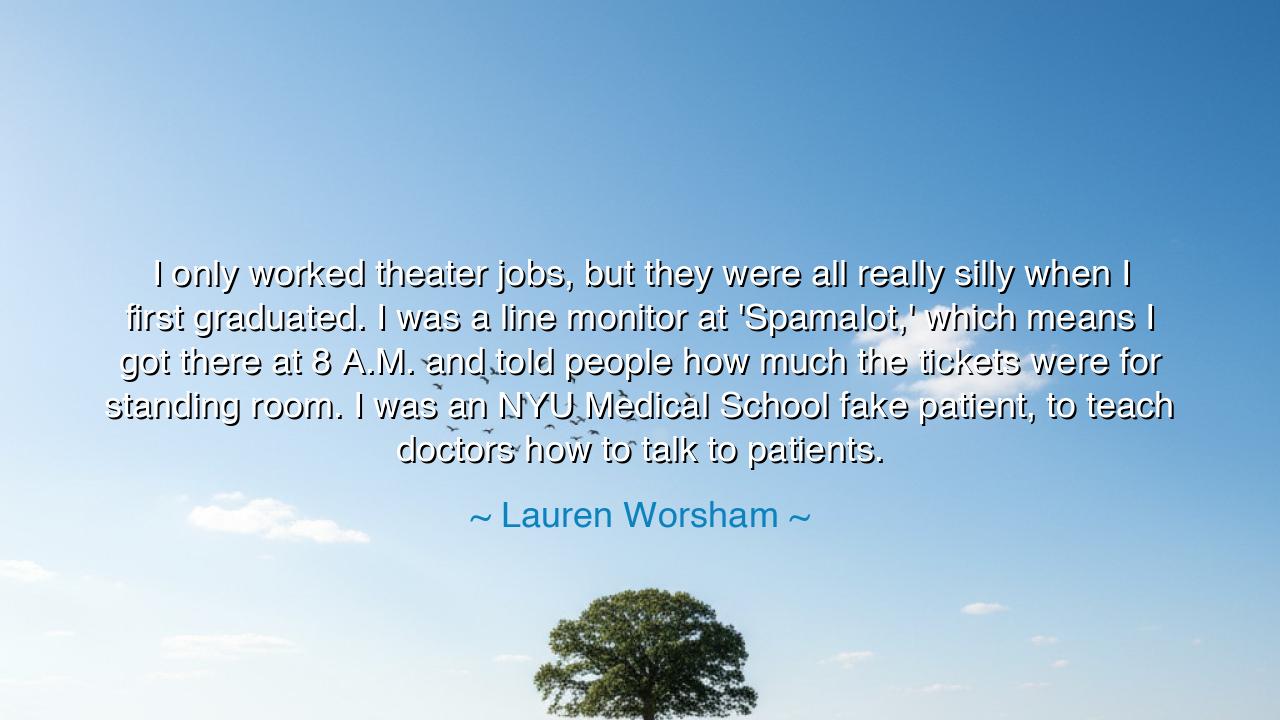
I only worked theater jobs, but they were all really silly when I
I only worked theater jobs, but they were all really silly when I first graduated. I was a line monitor at 'Spamalot,' which means I got there at 8 A.M. and told people how much the tickets were for standing room. I was an NYU Medical School fake patient, to teach doctors how to talk to patients.






When Lauren Worsham reflected, “I only worked theater jobs, but they were all really silly when I first graduated. I was a line monitor at Spamalot, which means I got there at 8 A.M. and told people how much the tickets were for standing room. I was an NYU Medical School fake patient, to teach doctors how to talk to patients,” she offered us more than an anecdote of youthful labor. She revealed the ancient truth that greatness often begins in humble tasks, and that even what seems silly in the moment may shape the foundation of wisdom, skill, and character. Her words are a testament to perseverance, to the small beginnings from which towering lives are built.
The meaning of her quote lies in the recognition that no work is wasted. To be a line monitor or a fake patient may appear trivial, even absurd, when compared to lofty dreams of the stage. Yet within these roles lies hidden training: the patience of standing in the early morning, the humility of serving eager fans, the empathy of simulating illness so that future doctors might learn compassion. What seems meaningless to the proud eye becomes, to the wise, the groundwork of discipline and resilience.
The ancients spoke often of such beginnings. Recall Cincinnatus, the Roman who, before being called to lead his people, was but a farmer at his plow. Or David, the shepherd boy, whose songs and stones prepared him for kingship. Just so, Worsham’s early theater jobs, small and unglamorous, carried within them seeds of greater artistry. For what is the actor’s craft if not the ability to embody roles, to empathize with strangers, to stand faithfully in the service of a story? Even as a fake patient, she rehearsed the art of performance and the art of human connection.
History too shows us that such humble beginnings can forge giants. Abraham Lincoln once split rails and clerked in shops before rising to lead a nation. He was not diminished by these early labors, but strengthened. The humility of his tasks gave him an understanding of ordinary lives, and the discipline to persevere when the weight of history pressed upon him. Worsham’s tale echoes the same rhythm: that the silly jobs of youth, borne with faith and persistence, become the bedrock of greatness.
The lesson is clear: despise not the days of small beginnings. Whether your role is grand or modest, whether you labor in shadow or in light, each experience builds the soul. The line monitor learns responsibility. The fake patient learns empathy. The dreamer learns humility. And in time, these qualities converge, shaping the artist, the leader, or the teacher you are meant to become.
Practical actions rise from this truth. Embrace your current labors, however small. Approach them not with scorn but with reverence, for they are your training ground. Seek the hidden lessons: patience in monotony, courage in humility, skill in seeming play. Remember that every role you inhabit, whether in a theater or in life, teaches you to become more whole.
Thus, Worsham’s words, though lighthearted, carry the depth of ancient wisdom: all work matters, and all paths, even the most silly, prepare us for what is to come. May you carry this truth with you, honoring each task, large or small, for in the end, the greatness of a life is not in where it began, but in how faithfully each step was walked.






AAdministratorAdministrator
Welcome, honored guests. Please leave a comment, we will respond soon